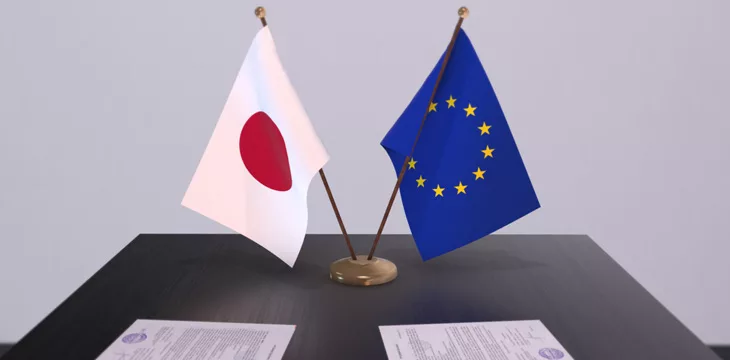
|
Getting your Trinity Audio player ready... |
Japan and the European Union have reiterated their commitment to explore emerging technologies and improve digitization efforts in their respective jurisdictions.
Representatives of both parties converged in Brussels to sign a Memorandum of Cooperation for the second time in less than a year. The new partnership will see the EU and Japan share ideas on innovation relating to artificial intelligence (AI), digital IDs, and semiconductors.
Under the deal, parties will probe quantum technology, high-performance computing (HPC), 5G, and 6G, exchanging ideas to maintain their leading edge with emerging technologies. Apart from sharing innovative strides, administrators in both jurisdictions will seek to “cut red tape and boost efficiency” to incorporate new technologies.
For digital IDs, both jurisdictions are keen to use blockchain technology to digitize processes, with the EU recording early successes with the offering. Japan will be looking to steal a page from the EU after its attempts at digital IDs recorded a slow start in mid-2023.
“Today, we reaffirmed our ever-closer strategic partnership with Japan,” said Thierry Breton, Commissioner for Internal Market. “Working toward common standards will facilitate seamless digital exchanges, support innovation and competitiveness, and create further opportunities for our economies.”
AI appears to be an integral part of the strategic partnership with both jurisdictions expressing an intention to closely supervise the sector. Already, the EU has seized the gauntlet to roll out a regulatory playbook for AI, which it says could be the blueprint for the rest of the world.
Despite the first-mover advantage, the EU AI Act has come under fire from a coalition of industry service providers for stifling innovation.
There are rumors that a cross-border collaboration with Japan could offer critical insights to even out the EU’s regulatory playbook for AI. Japan’s AI Safety Institute will run point with the EU AI Office to fashion uniform standards for both jurisdictions.
Both nations say they will continue their exploration of 5G and 6G technologies, pledging to pursue safe and resilient networks. The first iteration of the partnership saw the countries lay the foundations for joint studies on semiconductors and raw material supply chains for the tech space.
Japan’s tango with AI
Japan is matching the pace of global AI innovation after its enterprises unveiled a string of use cases for the technology. Farmers in the country are embracing a suite of AI-based harvesters to deal with growing labor shortages, while schools across the country have incorporated generative AI as learning aids.
Aware of the risks stemming from AI, a cross-section of Japanese residents are pining for watertight AI regulation to ensure safe usage. Authorities are proposing rules to stifle
incidents of bias and overreliance, with firms urged to set up internal guardrails before integrating AI into existing processes.
In order for artificial intelligence (AI) to work right within the law and thrive in the face of growing challenges, it needs to integrate an enterprise blockchain system that ensures data input quality and ownership—allowing it to keep data safe while also guaranteeing the immutability of data. Check out CoinGeek’s coverage on this emerging tech to learn more why Enterprise blockchain will be the backbone of AI.
Watch: Blockchain & AI—there should be confluence between these tech
Recommended for you
Lorem ipsum odor amet, consectetuer adipiscing elit. Elit torquent maximus natoque viverra cursus maximus felis. Auctor commodo aliquet himenaeos fermentum
Lorem ipsum odor amet, consectetuer adipiscing elit. Accumsan mi at at semper libero pretium justo. Dictum parturient conubia turpis interdum

 11-22-2024
11-22-2024


